Felix Muñoz was still a teenager when Fernando Valenzuela parted the sea of fans lined up to shake his hand on Olvera Street in the 1980s as the world champion beelined it towards the taquitos. The hordes of Fernandomania-crazed Dodger fans are just one of many memories held dear by the storekeeper, who has worked in the area since he was 14 years old.
Like many other merchants on Olvera Street, Muñoz works seven days a week, building up a business in which he’s invested the last four decades of his life. Before finding his niche at a souvenir shop, he worked for tips on Olvera Street. Bouncing from gig to gig, Muñoz worked on cars and would fetch anything business owners paid him to bring from the store. Struggling to find steady work and make ends meet, the young man planned to move to Mexico before being taken under the wing of his former boss, Augusto Godoy and other mentors, who would eventually sell the shop to Muñoz when they retired in the 80s.

Felix Muñoz mans the register at his store he operates mostly solo with the occasional help of his daughter. Photo by Marcos Franco
Now 58 years old and owner of the tiendita “Muñoz Mexican Store,” the vendor fills his shop with memorabilia, including luchador masks, keychains and leather goods, some of which are sourced locally while others are brought back from his travels to Chiapas, the Yucatán, Puebla and Jalisco. A lifetime of working in a melting pot of ethnicities has allowed Muñoz to sharpen his still-rusty Chinese.
“The culture here is beautiful,” Muñoz said. “You meet people from all over the world, I met my wife here and I have my daughters now to help me when I take a day off. It’s a place where people come to experience multiple cultures and hear different languages.”
Boutiques like Muñoz’s are only made possible by the activism of Christine Sterling, a wealthy, well-connected preservationist who moved to Los Angeles from Oakland with her husband and two children in 1920. Known as the “Mother of Olvera Street,” Sterling established the Mexican marketplace on Easter Sunday, 1930, coming off years of petitioning city leaders, which saved the Ávila Adobe, the city’s oldest house, from demolition.

The walkway to Felix Muñoz’s bunker storefront, Muñoz Mexican Store, which sells art, pottery and other souvenirs. Photo by Marcos Franco.
What was once the social center of El Pueblo was a run-down “dirty alley” lined with abandoned buildings by the time Sterling witnessed it, according to her personal journals. The admiration for “old missions, palm trees and sunshine” that brought Sterling to Los Angeles is the same vigor she used to round up the press and corner legislators into revitalizing the area.
Pablo Sanchez is the fourth generation in his family to work on Olvera Street. Tracing his roots back to the 1930s, Sanchez’s great-grandmother Coco was the first to establish the family’s origin, selling pottery in front of the Ávila Adobe 90 years ago. His grandfather would eventually follow in her footsteps, working as a shoe shiner years before the current family business, “Andrea’s Gift Shop,” was founded in the 1950s. Sanchez’s mother passed it down to him in 2006 and he now runs it solo, four days a week.
The store sources materials from within the U.S. as well as Guerrero, Mexico and throughout Peru. Sanchez launched a short-lived website during the pandemic in hopes of advertising the business and maintaining sales during the closure, but stopped updating the page when it wasn’t getting clicks. The gift shop once operated seven days a week but dropped to four as Sanchez feels foot traffic in the area isn’t what it used to be.
“I’d like to come in more often, but even on a Saturday there’s just not really the clientele, so it’s a little bit harder on us nowadays because the events aren’t bringing people in as much,” Sanchez said. “I want to bring more quality to our shop, which I feel has been somewhat neglected over the years, but lately I’ve brought in more interesting and unique items to set us apart from other shops.”

Pablo Sanchez makes a sale at Andrea’s Gift Shop which features products from the U.S., Mexico and Peru. Photo by Marcos Franco.
Despite the reduction in business, Sanchez is grateful to be part of a family tradition and looks forward to November, when Día de los Muertos parades flood the streets with vibrant marigolds and serape-clad skeletons.
Growing up on a livestock ranch in Santa Clarita, Jackie Hadnot remembers running down to the railroad crossing near his home at age three to watch in awe as trains passed. A few years later, he would establish his artistic ability, sketching up and selling cartoons to his peers. It wasn’t until his early teenage years that Hadnot whittled his first masterpiece, a hand-carved train that hung in a local art gallery for roughly two weeks before a representative called and told him to pick up a check for his work.
The tenured woodworker has since shifted his artwork to meet the needs of local historical buildings, museums and other city organizations, a display that could be seen at the north end of Olvera Street, where La Placita’s wooden cross stands. His piece is the third cross to mark the area since 1929, according to former Las Angelitas del Pueblo tour guide Terry Butcher, and has been a part of Olvera Street for the last six years. Although observers have made the offer, Hadnot chooses not to sell his artwork but instead creates storyboards around it that give insight into his inspirations.
“When people are inspired by my work, it motivates me even more not to sell it and to put it in a public building instead,” Hadnot said. “If it inspires the musician, dancer, or writer to keep going and not give up, that continues carrying the good energy with the younger generation to stick with their arts. Sometimes we’re given a gift, and we need to use that gift to give back.”
Folks like Felix, Pablo, and Jackie are a part of history preceded by hundreds of artists and vendors who brought their own unique style and influence to Olvera Street decades before them. They’re a reminder of the deeply rooted culture that sets Los Angeles apart from most metropolitan cities in the country.

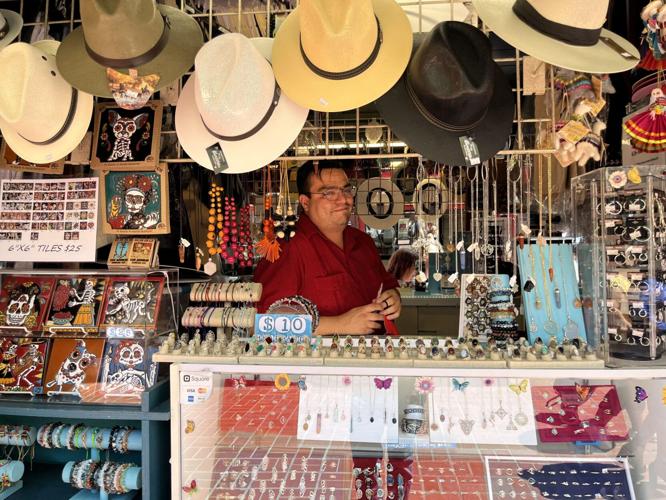
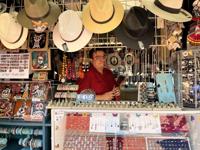
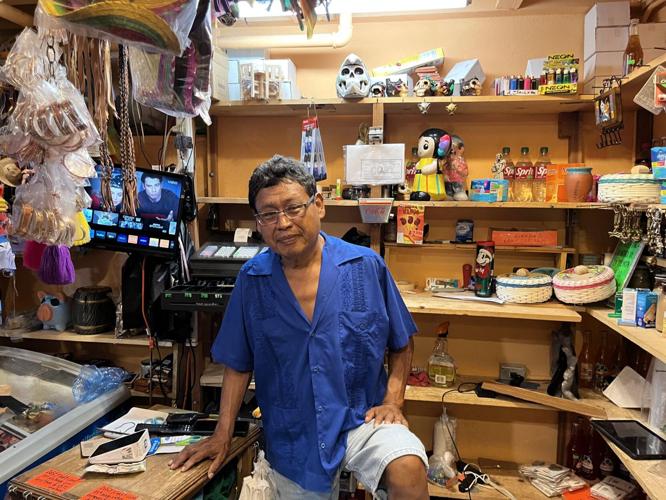
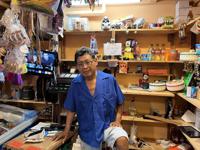
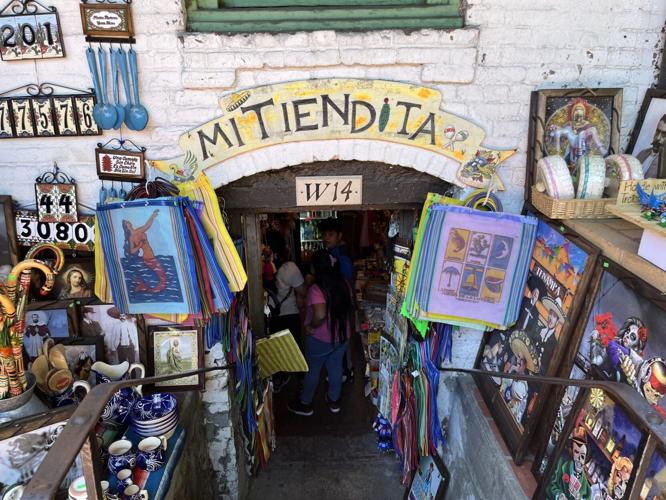
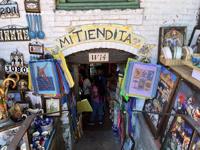

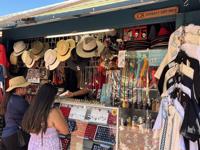
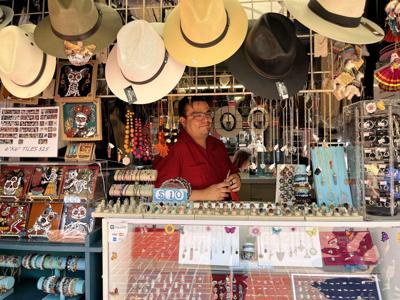

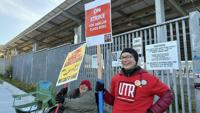



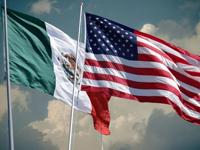

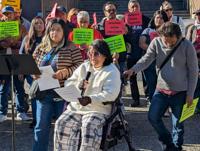
(0) comments
Welcome to the discussion.
Log In
Keep it Clean. Please avoid obscene, vulgar, lewd, racist or sexually-oriented language.
PLEASE TURN OFF YOUR CAPS LOCK.
Don't Threaten. Threats of harming another person will not be tolerated.
Be Truthful. Don't knowingly lie about anyone or anything.
Be Nice. No racism, sexism or any sort of -ism that is degrading to another person.
Be Proactive. Use the 'Report' link on each comment to let us know of abusive posts.
Share with Us. We'd love to hear eyewitness accounts, the history behind an article.